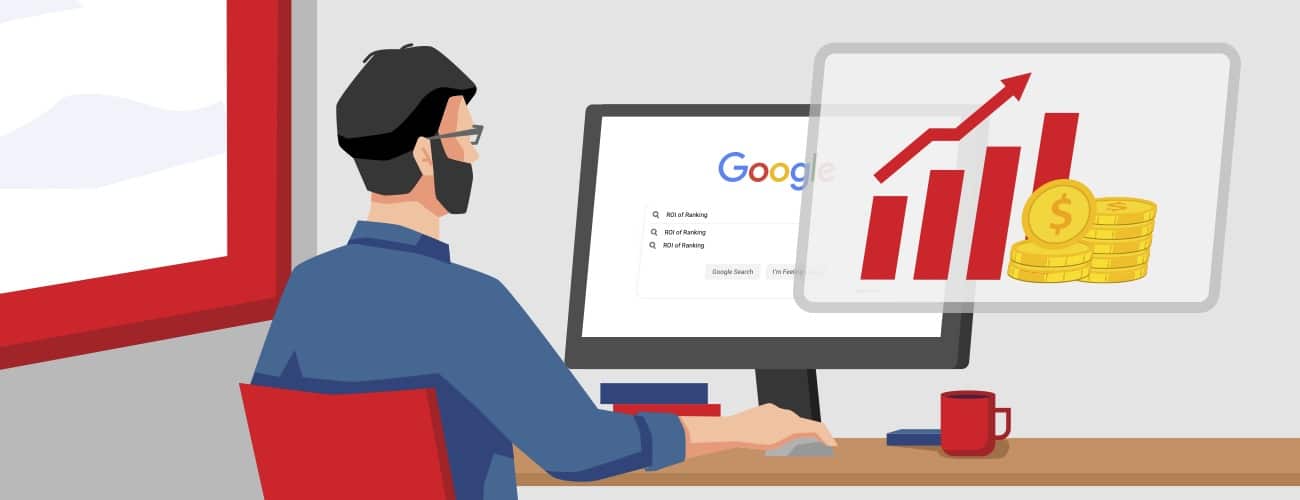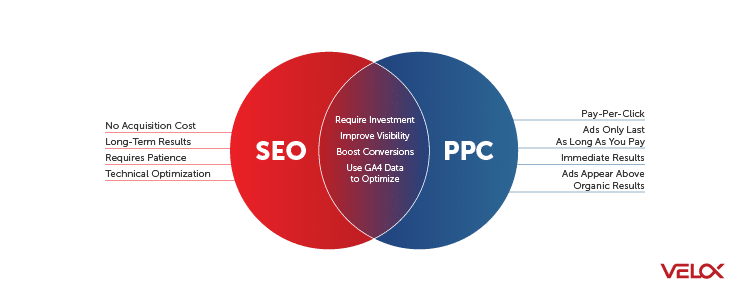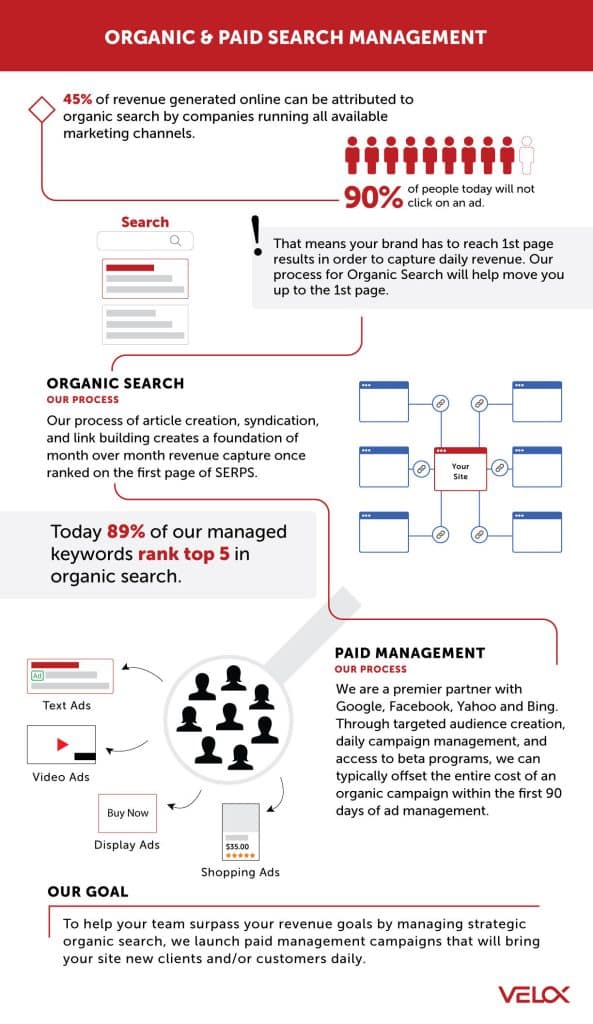
April 19, 2023
The ROI of SEO & Ranking in Google Search
Digital marketing is all about return on investment (ROI).
The goal is to reach as many people and bring in as much revenue as possible while paying as little as you can.
This leads many marketers to compare different channels, such as paid search, social media, and SEO, based on ROI alone.
But tons of people are skeptical about SEO and its potential to drive digital marketing ROI.
After all, viewing your ROAS within Google Ads and other paid channels is pretty easy, but it can be a bit more challenging for an SEO campaign.
This leads some to claim that SEO is dead (it’s not) and it’s time to invest 100% into paid (not quite).
But wouldn’t you rather make decisions based on meaningful data rather than rumor?
The global SEO market is expected to grow by nearly $10 billion in 2023, totaling some $60.6 billion by year’s end. If you don’t have your calculator handy, that’s a CAGR of 19.1%.
You won’t see figures like these from some flavor of the week. SEO is here to stay.
In fact, a well-executed SEO strategy powered by the latest research and implemented by a team of experts can make all the difference.
We’re not talking about nebulous intangibles. VELOX delivers real, measurable ROI by helping businesses all over the world exceed expectations for KPIs.
To truly understand the value of SEO and how your business can get the most out of a bespoke SEO strategy, you need to know about the rock upon which digital marketing was built: organic search.
SEO Has Limitless ROI Potential
There’s no one-size-fits-all solution for digital marketing.
Depending on the size of your company, your industry, whether you’re local or global, and a host of other factors, you’ll find that certain tactics help you smash your KPIs, while others might prove ineffective.
Regardless of these factors, there’s one thing every organization must do to achieve results:
Reach your customers where they are.
No matter your vertical, buyer personas, or marketing budget, if you aren’t active in the same channels as your potential customers, you can’t expect your marketing campaign to deliver a high ROI.
Sure, you could embrace zero-click content on social platforms or pursue influencer marketing, but there’s a dirty little secret about these approaches: Even on the channels best aligned with your target demos, these methods merely scratch the surface of the $681.39 billion global advertising market.
So how do you intelligently allocate your spend and optimize marketing ROI?
Just ask your colleagues.
In a Twitter poll, 49% of digital marketers said organic search provided the best ROI. Channels including email, PPC, and others were among those preferred by the remaining 51%.
It’s fairly evident why so many marketers think so highly of organic search’s ROI.
It could be because 53% of consumers in the United States use search engines for product research.
Or, it could be because Google is the world’s most visited website, with some 97 billion visits in February 2023.
Each channel offers unique advantages, and there’s nothing wrong with social ads, and a robust PPC effort can help increase awareness for a business or product that’s just getting off the ground.
However, there’s no substitute for organic search. And it’s clear that a tailored, ROI-focused SEO strategy is crucial to getting the most out of this dominant channel.
After all, the top result in Google SERPs receives a CTR of 27.6%, all without having to pay for a single one of those clicks.
But even with all of that in mind, pinning down the ROI of SEO can be a little more challenging than finding the return for a PPC campaign.
Understandably, that can make deliberate, frugal decision-makers apprehensive about investing in SEO.
But that doesn’t mean it’s impossible to find the ROI for a well-managed organic search campaign. And with those numbers in hand, making the choice between PPC and organic search becomes easy.
The Main Differences Between PPC and SEO ROI
To better understand how the ROI of SEO and PPC differ, it helps to understand the primary purpose of each campaign type and what you could reasonably expect.
PPC is best for raising awareness about a product or service and capturing late-stage shoppers. You set your budget, and your ad appears near the top of SERPs, above the organic listings.
As long as you keep paying for clicks and managing your campaign, your PPC ads will remain active. But maximizing your PPC ROI requires careful ad management and targeting, not to mention ongoing optimization to keep cost-per-click low.
SEO is all about the long game. It’s not for the impatient, but those who stick it out find incredible value in their campaign, especially if their site ranks highly in SERPs.
It’s like comparing sprinters to marathon runners. They each have a particular skill set, but digital marketing veterans know that building a brand is a marathon in most cases.

To gain—and maintain—the organic search visibility that drives winning traffic, there’s no substitute for robust SEO work. From link-building to on-site optimization, a holistic approach to SEO provides unparalleled benefits with true longevity.
Yes, SEO is dynamic and more complex than ever, but that’s only because Google continues improving its offerings on SERPs to deliver more value to the user.
As more people use and trust what they find on SERPs, those top organic positions become even more valuable to marketers.
SEO and PPC Can Work Together
The good news is you don’t need to choose one or the other when evaluating the ROI of SEO and PPC.
Since SEO is a fundamentally long-term process, many clients find the most value in a hybrid approach to search engine marketing.
In truth, SEO campaigns take 4 to 6 months to gain traction and start delivering results that drive better KPIs, but you shouldn’t expect to see the best results until your campaign has been running for about a year.
To get the most out of your social ads or PPC campaign, it’s wise to pair these short-term tactics with an SEO strategy that will help your business grow over time. That way, as your site begins climbing up the ranks of organic search, you can scale back your PPC budget or further target it only to searchers in the later stages of the buying process.
Knowing what to expect before you embark on an SEO journey is important, because growing impatient can prove costly.
Some businesses pivot away from organic SEO after a month or two when they don’t see immediate gratification, returning their focus to a paid or social channel.
That’s not to say they won’t achieve the unique results that are right for their particular situation, but now they’ve essentially forfeited their organic-side investment.
Like real estate, bonds, or mutual funds, comprehensive SEO is a long-term investment.
Treat your SEO campaign as you would any forward-looking financial strategy, and you’ll see the results that keep the SEO industry growing at such a rapid pace.
RELATED: Organic vs. Paid Search: Which Gets the Most Clicks?
How to Calculate the ROI of SEO
So now that you know how a patient, deliberate SEO strategy should progress, how do you crunch the numbers to determine your ROI?
Typically, PPC ROI ends up in the neighborhood of 200%. Determining PPC ROI is straightforward, but this figure is well short of the 5:1 ratio generally targeted by marketers.
SEO ROI, on the other hand, can be a bit more difficult to pin down. At VELOX, we target a minimum ROI in the range of 400%-800%, but we can also tailor campaigns to achieve over 1,000% ROI.
The good news is you can calculate the ROI of SEO using the standard ROI formula:
SEO ROI = (Revenue – Expenses) / Expenses
The key is determining the two variables in your specific situation.
Determining your revenue can be pretty straightforward if you run an eCommerce business and you’ve set up your Google Analytics 4 property to track meaningful events and conversions.
But for lead-generation or B2B companies, you’ll need to lean on Customer Lifetime Value and Close Rate to arrive at a revenue figure.
Analyzing your SEO cost is simple if you partner with a leading agency. Or, if you have an in-house team using paid tools, you may have to calculate salaries, overhead, and subscription payments.
Ultimately, the SEO ROI you should expect will be as unique as your business. But overall, SEO delivers outsized results compared to paid channels.
Once your campaign gains traction, your SEO results grow exponentially—that fact alone makes a strong case for investing in SEO.
Moreover, SEO tactics like link building and on-site optimization deliver enduring results. These are long-term benefits that don’t go away as soon as you turn the spigot off.
Using paid channels means your customer acquisition comes at a cost. Organic SEO involves no bidding and no cost per click.
Besides, if your site doesn’t follow the best practices necessary for organic search success—such as publishing helpful content and delivering a quality user experience—a standalone paid effort isn’t going to do much for your business.
How VELOX Takes Your SEO ROI to the Next Level
The digital landscape is constantly evolving, but if there’s one thing for certain, it’s this: Ranking highly on SERPs is essential for any business that wants to outperform the competition and enjoy the exponential returns that drive growth.
It doesn’t matter whether you’re an international conglomerate spanning continents or a small business—engaging your customers online at various funnel stages is critical to your success, and you can’t do this effectively with a clunky page experience or content that isn’t built to rank.
Google is reinventing itself as a discovery engine. With quality content and an optimized on-site experience, you can ensure the right customers are discovering your brand.
Regardless of how the internet continues to adapt, it’s clear that a customized SEO strategy can make all the difference, both now and in the future.
Organic SEO is simply the most effective way to achieve lasting results with outstanding ROI that will have all your stakeholders smiling.
It’s not just the numbers that bear this out—remember, nearly half of digital marketers polled said that SEO provided better ROI than any other channel.
Although PPC, when applied correctly, can give you the lift you need to get off the ground quickly as your SEO campaign gains traction, this technique can’t compete with the volume or longevity of organic SEO.
Besides, it just wouldn’t make sense to pay an acquisition cost for each customer with an ROI around 200% when, instead, you could acquire qualified traffic without bidding and see your ROI surpass 1,000%.
VELOX is ranked in the top 3% of agencies worldwide because we craft custom SEO solutions for each client and exceed expectations. You don’t need to comb web pages and pay for online courses to understand the ins and outs of SEO—instead, let our expert team devise a unique SEO strategy for your brand and show you what real ROI should look like.

Enhance Your SEO ROI with VELOX
SEO can seem intimidating, but it’s clear that optimal performance in organic search is by far the most effective means of driving the results your business needs to grow.
The SEO experts at VELOX use the latest data and research to tailor an SEO strategy to your needs. As a Google Premier Partner, we’ve been delivering outstanding results for our clients for over a decade.
Ready to crush your KPIs? Partner with VELOX today and see what SEO can do for you.